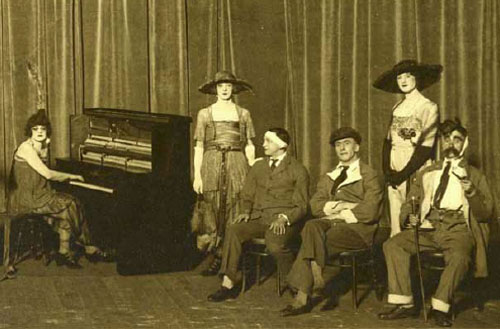
If war is hell, those in charge of the fighting need to find ways to keep soldiers marching through the flames.
Maintaining morale has always been a challenge. In the Second World War, famous performers such as Bob Hope and Judy Garland told jokes and sang to entertain the troops and boost morale. But in the First World War, the Canadian troops relied on a more homegrown form of entertainment: soldiers who could sing or tell a story were taken from the front lines and given a part to play onstage.
Jason Wilson, a PhD student in history, has written about these wartime entertainers in his new book Soldiers of Song: The Dumbells and Other Canadian Concert Parties of the First World War. The story was originally his master’s thesis, but he has spent several years transforming it into a book.
These performers played an important part in fighting the war; Wilson points out they were considered a priority by the generals setting strategy. The performers also left an entertainment legacy that continues to influence Canada today. “You can draw an arc from the Dumbells right through to Wayne and Shuster and from there to Second City and Saturday Night Live,” says Wilson.
“That kind of surreal, dark humour got its start during the First World War, and the Dumbells were Canada’s best example of that.” Some of the former Dumbell performers became writers for Wayne and Shuster, and Shuster’s former son-in-law is Lorne Michaels of Saturday Night Live.
Although the army-organized concert parties had an official mandate to boost morale, the soldiers on stage would make fun of the war and those in authority. “I wonder how they got away with it sometimes,” says Wilson. Because the entertainers were soldiers themselves, “for the audience, it was like looking at a mirror. The performers were able to connect very deeply with their audiences, who understood all the coded humour.”
The shows drew heavily on British music hall formats with songs and skits. “They took some of the songs directly from the music halls,” says Wilson, “but there was also a lot of original material.” Jack McLaren, one of the later members of the group, wrote “very, very funny sketches.” One was called “The Duchess Entertains” and featured a snooty duchess (played by one of the men dressed up as a woman) entertaining invalid soldiers with opera music and highbrow poetry. The soldiers are bored to tears, and it’s only when Genevieve Fewclothes arrives (again, played by a man dressed as a woman) that they become more interested.
“This would have been pretty racy stuff in 1917,” says Wilson.
Many of the skits included men dressed as women. One of the actors, Ross Hamilton, played a character named Marjorie, and Wilson says, “He was beautiful; the photos of him with make-up and wig are stunning. He was proposed to more than once. I think there might have been some soldiers naive or gullible enough to think this was a real woman, and others simply willing to play along. It certainly tested some of the boundaries.” Other men played female roles as caricatures, like the pantomime dame from British theatre.
After the war, the Dumbells toured Canada for 12 years, bringing their songs and skits to audiences in small towns and large cities. They also were the first Canadian musical revue to appear on Broadway, in a 1920 show called Biff, Bing, Bang. They also made more than two dozen recordings. Yet one of the remarkable things about this group, says Wilson, is that little has been written about them, and they are largely unknown today.
Wilson first heard about the Dumbells and their achievements while listening to the recordings from a CBC series about the First World War. He noticed that while most of the interviews of soldiers he found lasted 10 or 15 minutes, the one with former Dumbell Jack McLaren lasted two hours. After hearing it, Wilson was hooked. “I was fortunate in being able to find some families who had a treasure trove of documents and Dumbellania,” he says. “I just think this is an incredible story that should be told.”
In addition to working on his PhD, Wilson teaches a course at the University of Guelph-Humber on the history of hockey. He’s also continuing with his musical career, which has already earned him two Juno nominations and a Canadian Reggae Music Award. With a new album wrapped up, he’s planning a tour to introduce it; see www.jasonwilsonmusic.com for dates and locations.